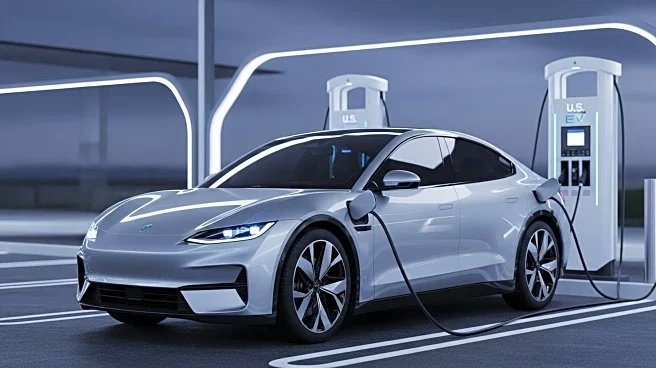What's Happening?
Tesla's market share in the U.S. electric vehicle (EV) market has dropped to 38% as of August, marking the first time since 2017 that the company's share has fallen below 40%. This decline is attributed to Tesla's focus on non-EV products such as robotaxis and Optimus robots, while delaying or canceling plans for more affordable EVs. The company has not launched a new model since the Cybertruck in 2023, which has not significantly boosted sales. Meanwhile, competitors like Hyundai, Honda, Kia, and Toyota have seen significant increases in their EV sales, with Volkswagen's sales rising by over 450% in July due to attractive lease prices and free fast charging.
Why It's Important?
Tesla's declining market share indicates a shift in the competitive landscape of the U.S. EV market. As legacy automakers ramp up their EV offerings, Tesla faces increased competition, which could impact its dominance in the sector. The decline also highlights the importance of product innovation and diversification in maintaining market leadership. Tesla's strategic focus on robotics and AI may be diverting resources from its core automotive business, potentially affecting its long-term growth and profitability. This shift could have significant implications for investors and stakeholders in the EV industry.
What's Next?
Tesla's future strategy will likely focus on balancing its ambitions in robotics and AI with the need to innovate and expand its EV lineup. The company's upcoming shareholder meeting in November will address a proposed $1 trillion compensation package for Elon Musk, contingent on achieving key milestones, including market share growth and production of new technologies. Additionally, a non-binding vote on Tesla's potential investment in xAI, Musk's AI venture, will be considered. These decisions could shape Tesla's strategic direction and influence its competitive position in the evolving EV market.
Beyond the Headlines
The potential investment in xAI raises questions about Tesla's priorities and the allocation of resources. While synergies between Tesla and xAI could enhance technological capabilities, the financial burden of such an investment may strain Tesla's resources. The decision to pursue AI and robotics over new vehicle models could impact Tesla's brand identity and market perception. As the EV market becomes more crowded, Tesla's ability to maintain its innovative edge and market leadership will be crucial in determining its future success.










